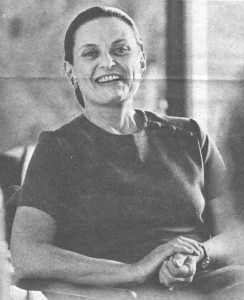Women’s rights moves into politics
Continuing my exploration of feminism in the 1970s, a profile for my New Zealand newspaper of a woman political candidate.
Women in Politics Part II
Women’s rights moves into politics
Cupertino, CA, October 1972
Rhoda Freier is a new phenomenon in American politics. She is an avowed feminist who has carried the banner of the women’s movement out of the rap sessions and the action groups, and into the male-dominated arena of party politics. As the Democratic Party candidate for the 22nd California Assembly District, her platform is environmental protection and zero population growth.
Until seven years ago Rhoda Freier’s life reflected the malaise of many an American housewife whose children are gone off to school, leaving her with time on her hands. Then the Freiers moved to California. Suddenly all her latent dissatisfactions burst into full bloom. “California does that to people,” she says. Maybe it’s something in the air!”She went back to college to continue her studies in biology and to upgrade her teaching qualification. Her biology studies led her next to Zero Population Growth. Environmental and population concerns began to coalesce into women’s problems.
National Organization for Women (NOW) was the culmination of all these interests and the one which has commanded her strongest loyalties. She became president of the South San Francisco Bay chapter two years ago. As the mainstream of the women’s movement moved toward politics as the only effective method of achieving equality for women, it pushed her along with it.
Diffident and unwilling at first, she surprised herself by winning the three-way race for the Democratic nomination for 22nd District with a handsome 50 percent of the votes. The general election next month is going to be a more difficult proposition. “No matter how strongly you feel about an issue, you have to know how to go about it, and I really didn’t.” Her neophyte campaign organization functions on “a crisis to crisis basis.” Like most candidates, she directs the emphasis herself, with help from consultants within the Democratic Party. It is a strongly woman-centered effort, drawing heavily from NOW and ZPG. Her financial director is a busy young woman with a pre-school family and a part-time job as a children’s librarian, who has still found time to organize events like the jumbo-sized garage sale which netted a whopping $600 for the campaign coffers.
But by no means is it a female chauvinist affair. Ms Freier’s husband is her campaign manager. Paul Ehrlich, author of The Population Bomb, has taken time to speak on her behalf. Promises of help in the crucial pre-election work have come from prominent and experienced male members of the local Democratic Party.
Lack of funds is a chronic problem. Democrats, lacking the big business resources of the Republican Party, have traditionally relied heavily on union support. This in Ms Freier’s case has been conspicuously lacking, partly through her own inexperience, and partly through union opposition to the women’s Equal Rights Amendment, which she supports.
The attitude of the local press, who consistently refer to her as “the Women’s Lib candidate,” has also been an obstacle. “I have no qualms about being identified as a feminist. But the term ‘lib’ or ‘libber’ is used in a denigrating way that is very damaging and insulting.”
She doesn’t feel that being a woman is all that much of a handicap. But neither is it a conspicuous asset. A survey by the National Women’s Political Caucus showed that, of thirty new women candidates in the June primary election, only twelve are still in the race, and only two of these, including Rhoda Freier, won contested primaries.
“It’s hard to know what the factors were: unwillingness to vote for a woman; inexperience on the part of the woman running; lack of money? We’ll never know. But I’m certainly not doing what I did initially, which was to point out that we haven’t even reached the level of tokenism in the number of women in the legislature. Some people may be concerned about this, but the vast majority clearly aren’t.” Nowadays I tackle the positive aspects of my candidacy rather than the fact that I am a woman. I have tried to promote myself as a candidate who is more knowledgeable than most of the other legislators in environmental matters and in the need for population stabilization.”
But she does feel that her candidacy will have an impact on the image of women. “The fact of a woman coming forward as a women’s candidate opens new avenues of thought to a whole lot of people.”
POSTSCRIPT: Rhoda Freier lost the election to the Republican incumbent Assemblyman Richard Hayden, but went on to help establish a Bay Area chapter of the nonpartisan National Women’s Political Caucus.

what a blast from the past!!!! thanks